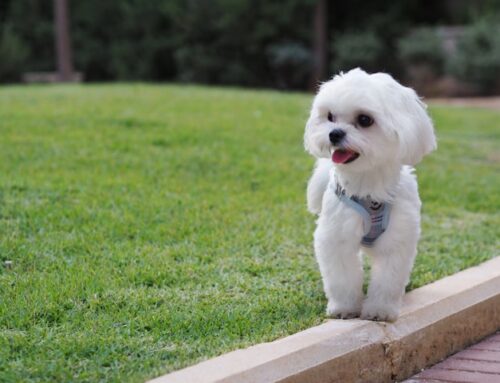Overview
Introduction: Dog Trainers Near Me
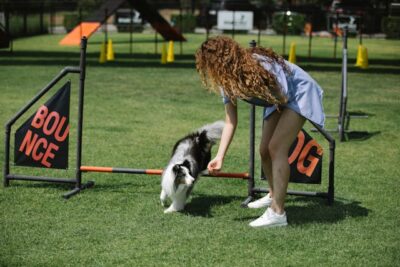
Finding the right dog trainer can make a world of difference in your pup’s behavior and overall well-being. With so many options for dog trainers near you, it’s important to know how to choose the best one for your furry friend.
In this guide, we’ll explore the key factors to consider when selecting a dog trainer, ensuring a positive and effective dog training experience for you and your pup. If you’re searching for ‘dog trainers near me,’ these tips will help you find the perfect fit.
Importance of professional dog training
Professional dog training, including basic obedience training, crate training, puppy training, and potty training, is essential for puppy parents and dog owners alike. It lays the foundation for a well-behaved and happy dog, strengthening the bond between the pet and the owner.
Professional trainers provide the expertise and guidance needed to address behavioral issues effectively, ensuring a harmonious relationship between the dog and its family. If you’re searching for ‘dog trainers near me,’ consider the benefits of professional training for your furry companion.
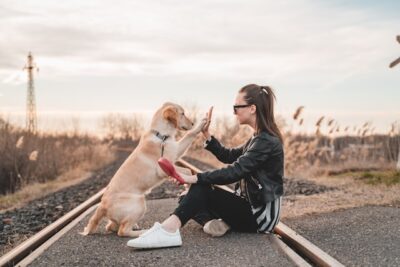
Benefits of choosing local dog trainers
Choosing local dog trainers for your new puppy offers several advantages in dog training. One of the key benefits is personalized attention. Local trainers can get to know your puppy’s unique personality, behavior, and learning style, allowing them to tailor training programs specifically to suit your puppy’s needs.
This personalized approach can lead to more effective training outcomes, as your puppy receives the individualized attention they require to learn good manners and socialization skills.
Additionally, local trainers are often more accessible than trainers located further away. This accessibility means that you can easily reach out to them for help and support as you navigate the challenges of puppy training. Whether you have questions about your puppy’s behavior or need guidance on training techniques, a local trainer is more likely to be available to provide the assistance you need. This level of support can be invaluable, especially for first-time puppy owners who may be unsure about the best ways to train their new furry friend.
Overall, if you’re searching for ‘dog trainers near me,’ choosing a local trainer for your puppy’s training needs can offer a range of benefits, from personalized attention to easy access to help and support. By selecting a trainer who understands the unique needs of local puppies, you can set your new furry companion up for a lifetime of good behavior and companionship.
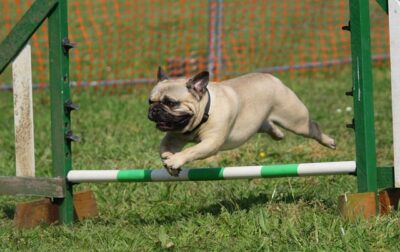
Understanding Your Dog Training Needs
Assessing your dog’s behavior and dog training requirements
Understanding your dog’s training needs is crucial, especially for new pup parents. Assess your dog’s behavior to determine the appropriate training, such as puppy training, positive reinforcement training, potty training, obedience training, and crate training.
Most dog owners benefit from keeping their puppy engaged through various activities, learning impulse control, and providing chew toys. Basic commands are essential for communication, and tailoring training to your dog’s specific needs ensures a successful training journey. When looking for ‘dog trainers near me,’ consider their expertise in these areas to provide the best training for your furry friend.

Determining your training goals and expectations
Understanding your dog’s training needs involves determining your goals and expectations. For puppy training, consider potty training, obedience training, and social skills development.
If you’re looking to train your dog to be well-behaved in public spaces or stay calm when guests arrive, you may need to work on longer periods of training and desensitization to open doors. Setting realistic goals and working consistently towards them will help you achieve success in your dog’s training.
When seeking ‘dog trainers near me,’ look for professionals who can assist you in achieving these goals effectively.
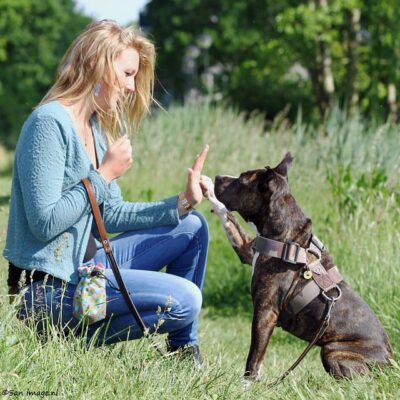
Types of Dog Training Programs
Basic Obedience Training
Basic obedience training is not just about teaching your dog to sit, stay, and come when called; it’s also about building a strong bond and mutual understanding between you and your furry friend.
These training programs provide a fun and exciting environment for both you and your dog, where they can socialize with other dogs and learn valuable skills that will benefit them for life.
During obedience training, your dog will not only learn basic commands but also essential life skills such as proper leash manners and how to interact politely with people and other dogs. These skills are crucial for your dog’s safety and well-being, ensuring they can navigate the world around them confidently and safely.
Moreover, obedience training is an excellent opportunity to address common behavioral issues such as barking, jumping, and leash pulling. Through consistent training and positive reinforcement, you can help your dog overcome these challenges and develop good behavior habits that will last a lifetime.
With a structured schedule and consistent training each week, your dog will not only learn the importance of sitting and walking calmly on a leash but also enjoy the process of learning and bonding with you. Obedience training is a rewarding experience for both you and your dog, laying the foundation for a well-behaved and happy companion.

Behavior modification training
Behavior modification training is a critical aspect of raising a well-adjusted and obedient puppy or young dog. These training programs are designed to teach basic commands like sit, stay, and come, as well as address specific behavioral issues that may arise, such as barking, jumping, digging, or leash pulling.
One of the key aspects of behavior modification training is its structured approach. Trainers use a variety of techniques, including positive reinforcement, to encourage desired behaviors and discourage unwanted ones. This structured practice helps puppies understand what is expected of them and reinforces good behavior over time.
Additionally, behavior modification training focuses on progress rather than perfection. It recognizes that puppies are still learning and growing, so the emphasis is on gradual improvement rather than immediate mastery. This approach helps build confidence in puppies and encourages them to continue learning and developing good habits.
Overall, behavior modification training is essential for teaching puppies how to behave appropriately and become well-behaved companions. It lays the foundation for a lifetime of good behavior and strengthens the bond between you and your furry friend.
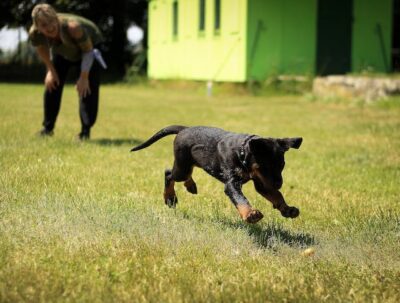
Puppy training
Puppy training programs are not just about teaching basic obedience commands; they are also about laying the foundation for a lifetime of good behavior and positive interactions.
These programs are designed to teach young pups essential skills such as sit, stay, and come, as well as socialization skills that will help them interact with other dogs and people in a friendly and confident manner.
One of the key aspects of puppy training is socialization. Puppies are introduced to a variety of experiences, including meeting new people, encountering different environments, and interacting with other dogs. This exposure helps them become well-rounded and adaptable adult dogs who are comfortable in various situations.
Training also includes teaching puppies how to walk on a leash properly. This skill is essential for both safety and enjoyment during walks. Puppies also learn basic commands such as “leave it” and “drop it,” which are crucial for their safety and well-being.
Crate training is another important aspect of puppy training programs. Puppies learn to see their crate as a safe and comfortable space, which can help with house training and provide them with a sense of security when left alone.
Additionally, puppy training programs often include time for puppies to explore, play with toys, and learn through observation. These activities are not just fun for the puppies; they also help reinforce positive behaviors and provide mental stimulation.
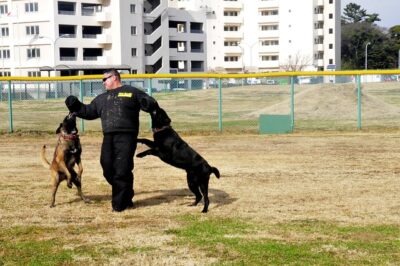
Advanced training programs
Advanced dog training programs are the next step for dogs who have mastered basic obedience commands. These programs focus on teaching more complex commands and behaviors, such as off-leash obedience, advanced agility, or even specialized tasks like therapy or service dog work.
One key aspect of advanced training is maintaining and refining existing behaviors. Dogs learn not just to perform commands but to do so reliably and consistently, even in distracting or challenging environments.
Trainers use a variety of tools and techniques to reinforce these behaviors, including positive reinforcement, clicker training, and sometimes remote training collars.
In addition to obedience commands, advanced training often includes teaching dogs how to act appropriately in various situations. This can include polite greetings with strangers, calm behavior around other dogs, and proper behavior in public places. These skills are essential for dogs who need to accompany their owners to work, travel, or participate in public events.

Qualities to Look for in a Dog Trainer
Certification and credentials
When choosing a dog trainer, it’s essential to look for certification and credentials in dog training. Most people forget that becoming a certified dog trainer can take weeks or even months of intensive training.
When choosing a dog trainer, it’s essential to look for certification and credentials in dog training. Most people forget that becoming a certified dog trainer can take weeks or even months of intensive training.
Certified trainers are equipped with the knowledge and skills to create effective training plans and maintain high standards of professionalism. They have undergone rigorous training and often continue their education to stay updated with the latest training techniques and behavioral science.
Moreover, certified trainers understand the importance of individualized training plans tailored to your dog’s specific needs. They can identify underlying behavioral issues and address them effectively, ensuring long-term success in your dog’s training.
By choosing a certified dog trainer, you’re not only investing in your dog’s training but also ensuring that you receive expert guidance and support throughout the training process. When searching for a trainer, consider using the keyword “dog trainers near me” to find certified professionals in your area.
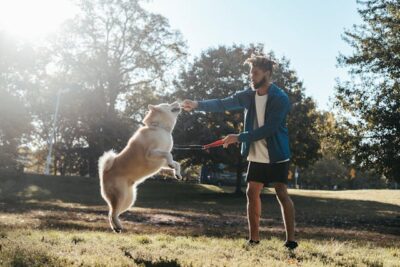
Experience and expertise
When searching for “dog trainers near me,” it’s crucial to prioritize experience and expertise. A seasoned dog trainer will possess a deep understanding of canine behavior and learning processes, allowing them to tailor their training methods to suit your dog’s unique needs.
An experienced trainer will have a solid foundation in the fundamentals of dog training, including obedience, socialization, and behavioral modification. They will also be proficient in using various tools and techniques to address specific behavioral issues your dog may be experiencing.
When you find a qualified trainer, they will be able to create a structured training program tailored to your dog’s needs and your goals. This program will help your dog learn to behave well both at home and in public settings.
In addition to experience, look for a trainer who demonstrates patience, compassion, and a genuine love for dogs. These qualities are essential for building a positive relationship with your dog and ensuring successful training outcomes.
Ultimately, choosing the right dog trainer near you can make a significant difference in your dog’s behavior and your relationship with them. Take the time to research and find a trainer who meets your needs and can help you achieve your training goals.
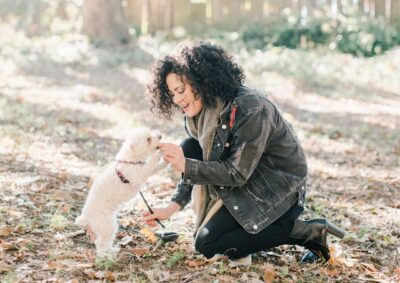
Positive training methods
When searching for “dog trainers near me,” it’s wise to prioritize trainers who utilize positive training methods. Positive reinforcement training focuses on rewarding desired behaviors, such as using toys, treats, or praise, rather than punishing unwanted behaviors. This approach not only effectively teaches your dog new skills but also strengthens your bond with them.
A good dog trainer will use toys as rewards, as this not only encourages healthy play but also reinforces good behavior. Toys can be used as a positive motivator during training sessions, making learning more engaging and enjoyable for your dog.
In addition to using positive reinforcement, a skilled trainer will focus on teaching essential skills that are crucial for your dog’s well-being and safety. These skills may include recall (coming when called), leash-walking (walking calmly on a leash), and attentiveness (paying attention to you in distracting environments). By teaching these skills, your dog will become more well-rounded and capable of enjoying a fun, enriching life with you.
When choosing a dog trainer, take the time to research and find one who aligns with your training philosophy and goals. A trainer who prioritizes positive reinforcement and focuses on teaching essential skills will help you and your dog build a strong, trusting relationship based on mutual respect and understanding.
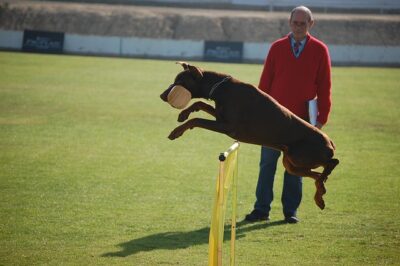
Compatibility with your dog’s temperament
When searching for “dog trainers near me,” it’s important to consider the compatibility between the trainer and your dog’s temperament. A good trainer will take the time to understand your dog’s personality, behavior, and learning style, and tailor their training approach accordingly.
Dogs, like humans, have unique personalities and temperaments. Some dogs may be more outgoing and eager to learn, while others may be more reserved or easily distracted. A skilled trainer will recognize these differences and adjust their methods to suit your dog’s individual needs.
Look for trainers who offer flexible scheduling and are willing to work with your dog over several weeks if needed. Training takes time, and progress may vary depending on your dog’s temperament and learning pace. A trainer who is patient and understanding will ensure that training progresses at the right pace for your furry friend, helping them learn effectively and build confidence along the way.
By selecting a dog trainer who is compatible with your dog’s temperament and offers personalized, flexible training options, you can help ensure a positive and successful training experience for you and your canine companion.
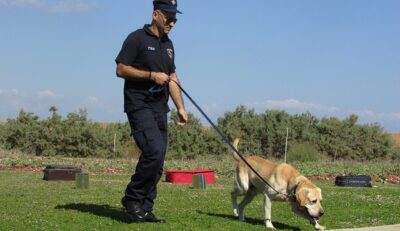
Researching Dog Trainers Near You
Local dog training facilities and trainers
When researching dog trainers near me for your new puppy, consider local training facilities and individual trainers. Look for programs that offer a comprehensive approach, including socialization, basic obedience, and addressing common puppy behaviors.
Visit the facilities if possible to assess the training environment and observe how they interact with puppies. Ask about their training methods, schedules, and if they offer programs tailored specifically for puppies. Additionally, inquire about their availability for home visits or training sessions in a familiar ground for your pup.

Online reviews and testimonials
When looking for “dog trainers near me,” online reviews and testimonials can be incredibly helpful in finding the right fit for you and your furry friend. Positive reviews that highlight a trainer’s ability to effectively teach both puppies and adult dogs are particularly valuable.
Pay close attention to feedback about the trainer’s methods, demeanor, and the results achieved. Positive reviews should mention how the trainer creates a positive and engaging learning environment for dogs, as well as how they address behavioral issues with patience and expertise.
In addition to online reviews, consider reaching out to past clients or asking the trainer for references. Speaking directly with people who have worked with the trainer can provide valuable insights into their training approach, professionalism, and success rate.
By researching dog trainers near you and paying attention to online reviews and testimonials, you can make an informed decision and choose a trainer who will provide your dog with the best possible training experience.

Referrals from friends, family, and veterinarians
When searching for “dog trainers near me,” seeking referrals from friends, family, and veterinarians can be a valuable way to find a reputable and effective trainer. Personal recommendations can provide insights into a trainer’s ability to teach both puppies and adult dogs.
Ask those who have provided referrals about the trainer’s methods, their rapport with animals, and the results achieved. Find out if the trainer was able to address specific behavioral issues effectively and if the training sessions were enjoyable and beneficial for the dogs.
Hearing about firsthand experiences from people you trust can help you make an informed decision when choosing a trainer for your furry friend. Additionally, veterinarians often have insight into local trainers and can recommend someone who is skilled and experienced in working with a variety of dog breeds and behaviors.
By seeking referrals from trusted sources and asking relevant questions about a trainer’s methods and results, you can find a dog trainer who is well-suited to meet your dog’s training needs.
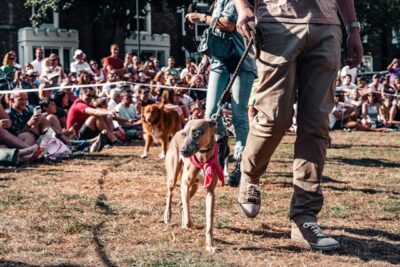
Checking for professional affiliations and memberships
When searching for “dog trainers near me,” it’s helpful to check for professional affiliations and memberships. Trainers who are members of reputable organizations often adhere to high standards of training and ethics.
Look for affiliations with organizations like the Association of Professional Dog Trainers (APDT) or the International Association of Canine Professionals (IACP). Membership in these organizations can indicate a commitment to continuing education and staying updated on the latest training methods, ensuring your puppy or dog receives quality training.
Trainers who are affiliated with these organizations may also have access to a network of resources and support, which can be beneficial in addressing specific training needs or challenges. Additionally, membership in these organizations may require trainers to adhere to a code of ethics, providing further assurance of their professionalism and dedication to their craft.
By choosing a dog trainer who is a member of reputable organizations, you can have confidence in their training methods and trust that they are committed to providing the best possible care for your furry friend.
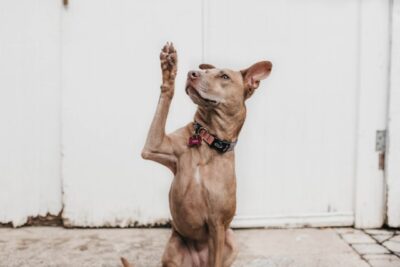
Questions to Ask Potential Dog Trainers
Approach to training
When searching for “dog trainers near me,” it’s important to inquire about their approach to training. Ask how they teach puppies and dogs, including their methods for reinforcing good behavior and addressing challenges. Inquire about their use of positive reinforcement techniques and how they incorporate crate training into their practice.
Additionally, ask how they encourage recall, manage distractions in the training room, and utilize toys or other tools to keep sessions engaging. Understanding their training philosophy and methods will help you determine if they are the right fit for your furry companion.
A good trainer will be able to explain their training approach clearly and provide examples of how they have successfully trained dogs in the past. They should also be open to discussing your dog’s specific needs and tailoring their training methods to suit your dog’s temperament and learning style.
By asking these questions and understanding the trainer’s approach to training, you can ensure that you find a trainer who will provide effective and positive training experiences for your dog.
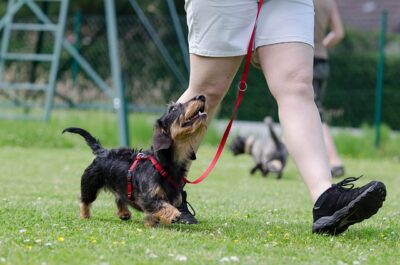
Training techniques and methods
When evaluating “dog trainers near me,” it’s crucial to inquire about their training techniques and methods. Ask how they teach basic commands like sit and how they handle practicing these commands with puppies and dogs.
Inquire about their approach to crate training and how they ensure that puppies and dogs feel comfortable and safe in their crates. Understanding their methods will help you determine if they align with your training philosophy and are suitable for your furry companion.
A reputable trainer will be able to explain their techniques clearly and demonstrate how they work in practice. They should also be open to discussing any concerns or questions you may have about their methods and be willing to adjust their approach to suit your dog’s individual needs.
By asking these questions and understanding the trainer’s methods, you can make an informed decision about whether they are the right fit for you and your dog.
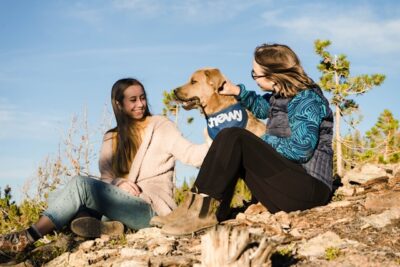
Success stories and client references
When considering “dog trainers near me,” it’s wise to ask about their success stories and request client references. Inquire about their experience training puppies and dogs, particularly in teaching commands like sit, and how they approach practice sessions.
Ask for specific examples of dogs they have trained successfully and how they addressed challenges along the way. Contacting past clients can provide valuable insights into the trainer’s effectiveness and whether their methods are a good fit for your pup.
A reputable trainer will be happy to share success stories and provide references to demonstrate their track record of success. They should also be willing to discuss their approach to training and how they tailor it to meet the needs of each individual dog.
By asking these questions and contacting past clients, you can gain a better understanding of the trainer’s abilities and determine if they are the right choice for you and your dog.

Training schedule and duration
When vetting potential “dog trainers near me,” it’s crucial to inquire about their training schedule and duration. Ask how often they conduct training sessions and how long each session typically lasts.
Inquire about the total duration of the training program and whether they offer flexible scheduling to accommodate your pup’s needs. Understanding the training schedule and duration will help you plan and ensure that your pup receives the necessary training to thrive in your house.
A reputable trainer will be able to provide a clear outline of their training schedule and duration, taking into account your pup’s learning pace and any specific training goals you have. They should also be willing to adjust the schedule as needed to ensure that your pup receives the best possible training experience.
By asking these questions and understanding the training schedule and duration, you can make an informed decision about which trainer is the best fit for you and your pup.

Cost and payment options
When considering “dog trainers near me,” it’s important to ask about the cost of their services and the available payment options. Inquire about whether they offer package deals for multiple sessions or if they charge per session.
Ask if there are any additional costs for training tools or materials. Understanding the cost and payment options will help you budget for your pup’s training needs and ensure a smooth payment process.
A reputable trainer will be transparent about their pricing and payment options, providing you with all the information you need to make an informed decision. They should also be willing to work with you to find a payment plan that fits your budget and needs.
By asking these questions and understanding the cost of the trainer’s services, you can ensure that you find a trainer who not only meets your training needs but also fits your budget.
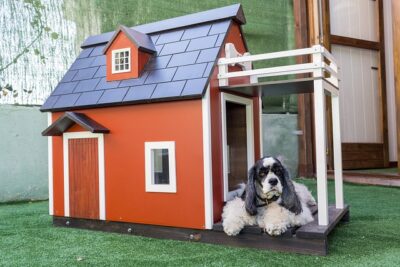
Visiting and Evaluating Dog Training Facilities
Cleanliness and safety of the facility
When visiting and evaluating “dog trainers near me,” pay attention to the cleanliness and safety of the environment. Look for well-maintained facilities that are free of hazards such as sharp objects or exposed wires.
Ensure that the training areas are clean and sanitized, with proper ventilation and adequate space for pups to practice commands like sit comfortably. Additionally, observe how pups are supervised and managed during training sessions to ensure a safe and secure learning environment.
A reputable trainer will prioritize the safety and well-being of the pups in their care, providing a clean and secure environment for training. By visiting the facility and observing the training sessions, you can ensure that the trainer meets your standards for cleanliness and safety.
By considering these factors when evaluating “dog trainers near me,” you can find a trainer who provides a safe and positive training experience for your pup.
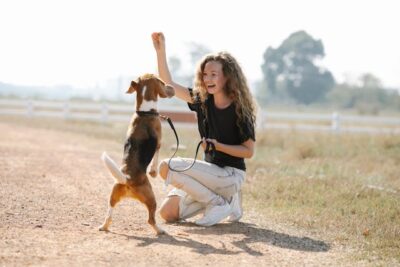 Interaction between trainers and dogs
Interaction between trainers and dogs
When assessing dog training facilities, it’s crucial to observe the interaction between trainers and dogs. Look for trainers who engage positively with pups, using encouraging tones and rewarding good behavior.
Observe how trainers teach commands like sit and how they practice these commands with pups. This can provide insight into the training methods used and how pups respond to them. Additionally, ask about the training schedule and how pups progress throughout the program.
Understanding the progression can give you insight into the quality of life pups experience during their training and whether the program is effective. Searching for “dog trainers near me” can help you find local facilities to evaluate.
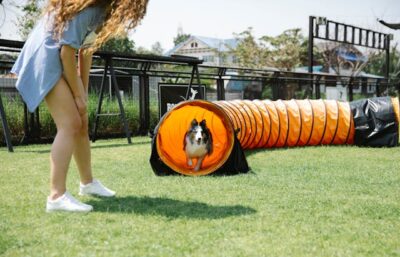
Available training equipment and resources
When visiting and evaluating dog training facilities, it’s important to take note of the available training equipment and resources. Look for facilities that provide a variety of tools to help pups practice commands like sit, such as treats, toys, and training aids.
Ensure that the facility has enough space for pups to move around comfortably and practice commands safely. A spacious environment can contribute to a positive learning experience for pups. Additionally, inquire about any additional resources or materials available to help pups progress throughout their training.
These resources can include training guides, educational materials, or access to trainers for additional support. Such resources can enhance the pups’ learning experience and overall quality of life during their training program.
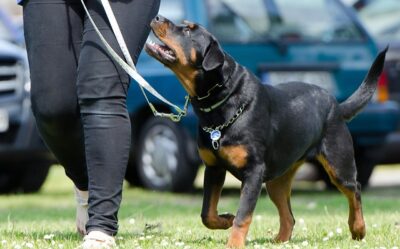
Making the Final Decision
Comparing and contrasting potential trainers
When choosing a dog trainer, it’s important to compare and contrast potential trainers based on several factors, including their approach to dog training, how they practice commands like sit, and the overall experience they offer for pups.
Compare the training schedules and methods used by each trainer, as well as their facilities and resources available for pups.
Additionally, take into account the trainer’s philosophy on training and how it aligns with your goals for your pup’s training and overall quality of life in your house. Searching for “dog trainers near me” can help you find local options to consider.
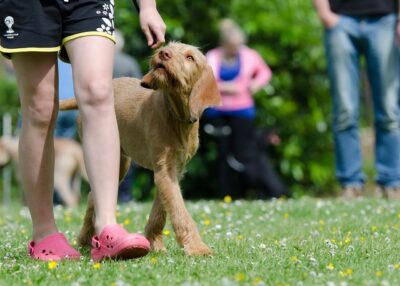
Trusting your instincts and gut feeling
When it comes to making the final decision on a dog trainer, trust your instincts and gut feeling. Consider how you feel about the trainer’s approach to dog training and whether you feel comfortable with them handling your pup.
Reflect on your interactions with the trainer and how they make you feel about their ability to teach commands like sit and practice them with pups. Do they seem knowledgeable, patient, and genuinely interested in your pup’s well-being? These qualities can indicate a good fit for both you and your furry friend.
Ultimately, choosing a trainer you trust can lead to a positive experience for your pup and set them up for success in their training and life in your house. Trusting your intuition can help ensure that you and your pup are in good hands throughout the training process.

Considering the overall value of the training program
When making the final decision on a dog trainer, consider the overall value of the training program. Evaluate the cost of the program in relation to the training methods used, the quality of the facilities and resources provided, and the potential benefits for your pup.
Reflect on whether the program offers comprehensive training that will set your pup up for success in their life in your house. Look for a program that covers essential commands like sit and also addresses behavior issues specific to your pup, if any. Consider whether the trainer provides ongoing support and guidance even after the formal training sessions are over.
Choosing a training program that offers good value can lead to a positive experience for both you and your pup. A well-rounded program that considers your pup’s individual needs and provides the necessary tools for their development can make a significant difference in their behavior and overall well-being.

Preparing for Your Dog’s Training
Gathering necessary information and paperwork
When preparing for your dog’s training, gather all necessary information and paperwork. This includes any forms or documents required by the training facility, such as registration forms, vaccination records, and health certificates.
Ensure that you have all necessary contact information for the trainer and the facility, as well as a schedule of the training sessions. Having everything organized and ready before the training begins can help ensure a smooth start to your pup’s training program and set them up for success in their life in your house.
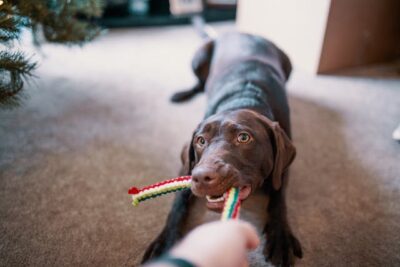
Preparing your dog for training sessions
When preparing your dog for training sessions, start by ensuring they are well-rested and have had a chance to relieve themselves. This sets the stage for a focused and attentive pup during training. Have their favorite treats or toys on hand to use as rewards, as these can be powerful motivators for learning new commands.
Practice basic commands like sit at home to reinforce their understanding and build a foundation for more advanced training. This also helps to establish a routine and a positive association with training sessions.
Keep training sessions short and fun to maintain your dog’s interest and focus. Dogs have short attention spans, so keeping sessions brief prevents them from becoming bored or frustrated. End each session on a positive note, even if it means stopping before your planned duration.
Create a calm and quiet environment for training to minimize distractions. Choose a location where your dog feels comfortable and safe, away from noisy areas or other animals. This helps your pup focus on learning and helps you maintain control of the training session.
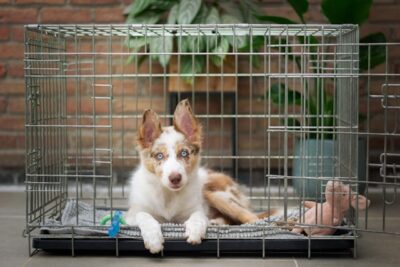
Setting realistic expectations for the training process
When preparing your dog for training sessions, ensure they are well-rested and have had a chance to relieve themselves. A tired or uncomfortable dog may struggle to focus during training, so it’s important to make sure they are comfortable and ready to learn.
Have their favorite toy on hand to use as a reward and practice basic commands like sit at home to reinforce their understanding. Using positive reinforcement and rewards can help motivate your dog to learn and make training more enjoyable for them.
Keep training sessions short and engaging to maintain your dog’s interest and focus. Dogs have short attention spans, so it’s best to keep training sessions brief and focused. You can always have multiple short sessions throughout the day rather than one long session.
Create a quiet, distraction-free room for training to help your pup concentrate and learn more effectively. Minimizing distractions can help your dog stay focused on the training tasks at hand and make the most of your training sessions together.
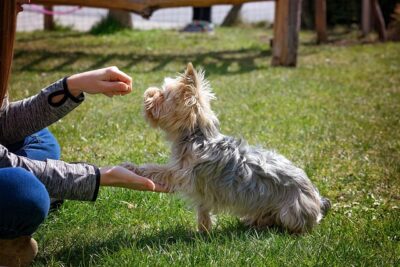
Conclusion: Dog Trainers Near Me
Recap of key points in finding the best dog trainers near me
- Finding the right dog trainer is crucial for your pup’s behavior and well-being.
- Consider factors like certification, experience, and training methods when choosing a trainer.
- Understand your dog’s training needs and set realistic goals for their training.
- Different types of training programs, including basic obedience, behavior modification, and puppy training, cater to different needs.
- Research local trainers, check reviews, and ask for referrals to find the best fit for your dog.
- Trust your instincts and consider the overall value of the training program when making a decision.
Importance of investing in professional dog training for your dog’s well-being
Professional dog training is essential for your dog’s well-being as it lays the foundation for a well-behaved and happy dog. It strengthens the bond between you and your pet, ensuring a harmonious relationship.
Professional trainers provide the expertise and guidance needed to address behavioral issues effectively, ensuring a positive and effective training experience for both you and your pup. Investing in professional dog training sets your dog up for success in their training and life in your house. If you’re looking for ‘dog trainers near me,’ consider the benefits of professional training for your furry friend.
If you are looking for puppies for sale in Georgia and surrounding areas, explore our delightful selection. Our puppies are thoughtfully bred from reputable breeders and receive regular health checks, socialization, and affectionate interaction from day one. We guarantee that the puppy you receive will meet your expectations and become a cherished addition to your family.
FAQs About Dog Trainers Near Me
- What is dog training?
- Dog training is the process of teaching your puppy or dog basic obedience commands, socialization skills, and good manners. It helps your dog learn how to behave appropriately in different situations, both at home and in public spaces.
- Why is dog training important?
- Dog training is important because it lays the foundation for a well-behaved and happy dog. It helps strengthen the bond between you and your pup and ensures a harmonious relationship. Training also provides mental stimulation for your dog and helps prevent behavioral issues.
- How long does dog training take?
- The duration of dog training can vary depending on your dog’s age, breed, temperament, and the training goals you have. Basic obedience training usually takes several weeks to a few months to complete, while behavior modification training may take longer.
- What are some common training techniques used by dog trainers?
- Dog trainers use a variety of techniques to train dogs, including positive reinforcement, clicker training, and marker training. These techniques focus on rewarding good behavior and ignoring or redirecting unwanted behavior.
- What should I look for in a dog trainer?
- When choosing a dog trainer, look for someone who is certified, experienced, and uses positive training methods. It’s also important to find a trainer who is compatible with your dog’s temperament and has a good understanding of your training goals.
- Can I train my dog myself?
- Yes, you can train your dog yourself, but it’s often beneficial to seek the help of a professional trainer, especially for more complex training needs. A trainer can provide guidance, support, and expertise to help you train your dog effectively.
- What is the best age to start training my puppy?
- It’s best to start training your puppy as early as possible, ideally around 8 to 12 weeks of age. Early training helps your puppy develop good habits and socialization skills, setting them up for success later in life.
- How can I find dog trainers near me?
- You can find dog trainers near you by searching online, asking for recommendations from friends and family, or contacting local pet stores or veterinary clinics. It’s important to research and interview potential trainers to find the best fit for your dog’s training needs.
- What should I expect during a training session?
- During a training session, you can expect to work on basic obedience commands like sit, stay, and come. The trainer may also address specific behavior issues or work on socialization skills. Sessions are typically held in a controlled environment, such as a training ground or a designated area in your home.
- How can I reinforce training at home?
- You can reinforce training at home by practicing commands regularly, using positive reinforcement techniques, and providing mental and physical stimulation for your dog. Consistency and patience are key to reinforcing training and helping your dog succeed.




